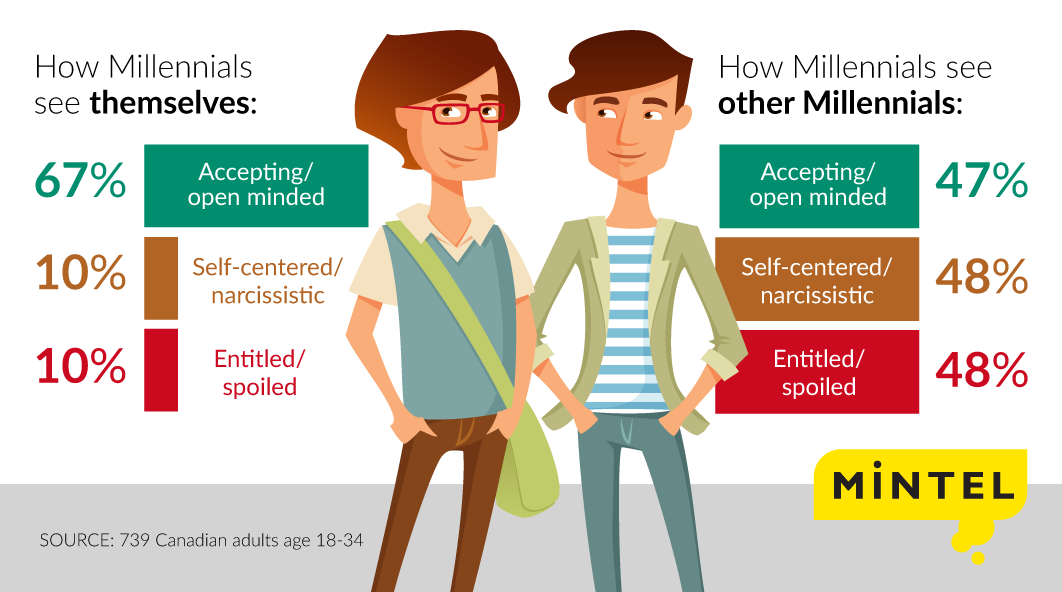Misunderstood Millennials: Canadian Millennials do not identify with generational labels
Canadian Millennials are having an identity crisis, as new research from Mintel reveals that they do not see themselves as fitting in with the stereotypical labels given to their generation. Millennials age 18-34 overwhelmingly view themselves as being accepting/open minded (67 percent). However, the majority of Millennials agree older generations see them as entitled/spoiled (63 percent) or self-centered/narcissistic (57 percent).
Despite Millennials believing that their generation is seen in a negative light, they tend to hold similar views of their peers: nearly half of Millennials believe their Millennial cohorts are self-centered/narcissistic (48 percent) or entitled/spoiled (48 percent). In addition to accepting/open minded, the top characteristics Millennials believe they possess are hardworking/ambitious (60 percent) and responsible (57 percent), while fewer see their peers as hardworking/ambitious (45 percent) or responsible (19 percent).
“Canadian Millennials view themselves as hardworking, unique individuals and reject the negative perceptions they believe older generations hold. The popularity of social media trends like selfies or sharing experiences online may be contributing to this divided generational perception. What’s more, in an era where one constantly sees posts of only the best experiences of their peers, a sense of self-obsession and competition among the generation is fostered and contradictory perceptions between themselves and peers form,” said Carol Wong-Li, Senior Lifestyles and Leisure Analyst at Mintel. “As Millennials push back against these negative generational labels and seek to differentiate themselves from peers, brands should avoid stereotypical features and focus on individuality and independence in their marketing efforts in order to better resonate with Millennials.”
Millennials’ self-perceptions fall in line with their reported financial independence, as Mintel research indicates that 62 percent of Millennials are primarily responsible for their living expenses, in addition to one quarter (23 percent) who say they share living expenses equally with someone else/others. Further, the majority of Millennials are living independently, as 39 percent live with their own nuclear family (ie spouse and/or children) and 21 percent live alone. As part of an increasing trend in recent years, one quarter (25 percent) of Millennials still live with their parents, driven primarily by 18-24 year olds (37 percent).
56% of Millennials say that saving even a little bit of money each month is difficult
All this independence is causing some Millennials to feel financial stress: Mintel research reveals that nearly half (48 percent) of Millennials feel constantly stressed about their money, well above the average consumer (36 percent). Additionally, 56 percent say that saving even a little bit of money each month is difficult. However, recent economic conditions have demonstrated the importance of saving for retirement for seven in 10 (70 percent) Millennials.
As Millennials adopt more cautious spending habits, the top characteristics they look for when buying products from their favorite brands are quality (65 percent) and affordability (58 percent), indicating they place value on both long-term investments and staying within their budget. Rewards programs also influence a sizable portion of Millennials (38 percent). Despite their budget savvy tendencies, one third (33 percent) of Millennials agree that it is okay to buy things on credit if they really want them.
“Our research finds that the state of the current economy is having an adverse effect on Canadian Millennials’ finances, causing them to be more stressed about money than the average consumer. Whether living independently or at home, Millennials are likely to be responsible for their own expenses, and the financially-stressed are looking to make purchases that also act as investments. Brands that market the quality and long-term benefits of their products and services will resonate with these cautious consumers,” continued Wong-Li.
And finally, during the purchasing process, some Millennials are inclined to “showroom” with 38 percent saying stores are best used for creating experiences around products they may later buy online. Some 35 percent of Millennials agree that they like to be one of the first people to buy new/trendy products, supported by one quarter (24 percent) who agree that their favorite brands sell cool/trendy products.
“Millennials display a penchant for being early adopters, as well as find ways to reward themselves for their hard work. Brands that offer incentives for adopting new products or services, and that engage consumers with unified messaging across all channels, will have the best chance of attracting showrooming Millennials,” concluded Wong-Li.
Press copies of the Marketing to Millennials Canada 2016 report and interviews with Carol Wong-Li, Senior Lifestyles and Leisure Analyst, are available on request from the press office.
For the latest in consumer and industry news, top trends and market perspectives, stay tuned to Mintel News featuring commentary from Mintel’s team of global category analysts.
-
Mintel StoreGet smart fast with our exclusive market research reports, delivering the latest data, innovation, trends and strategic recommendations....View reports
-
Mintel LeapMintel Leap is a revolutionary new AI-powered platform that will transform your research process....Book a demo








































